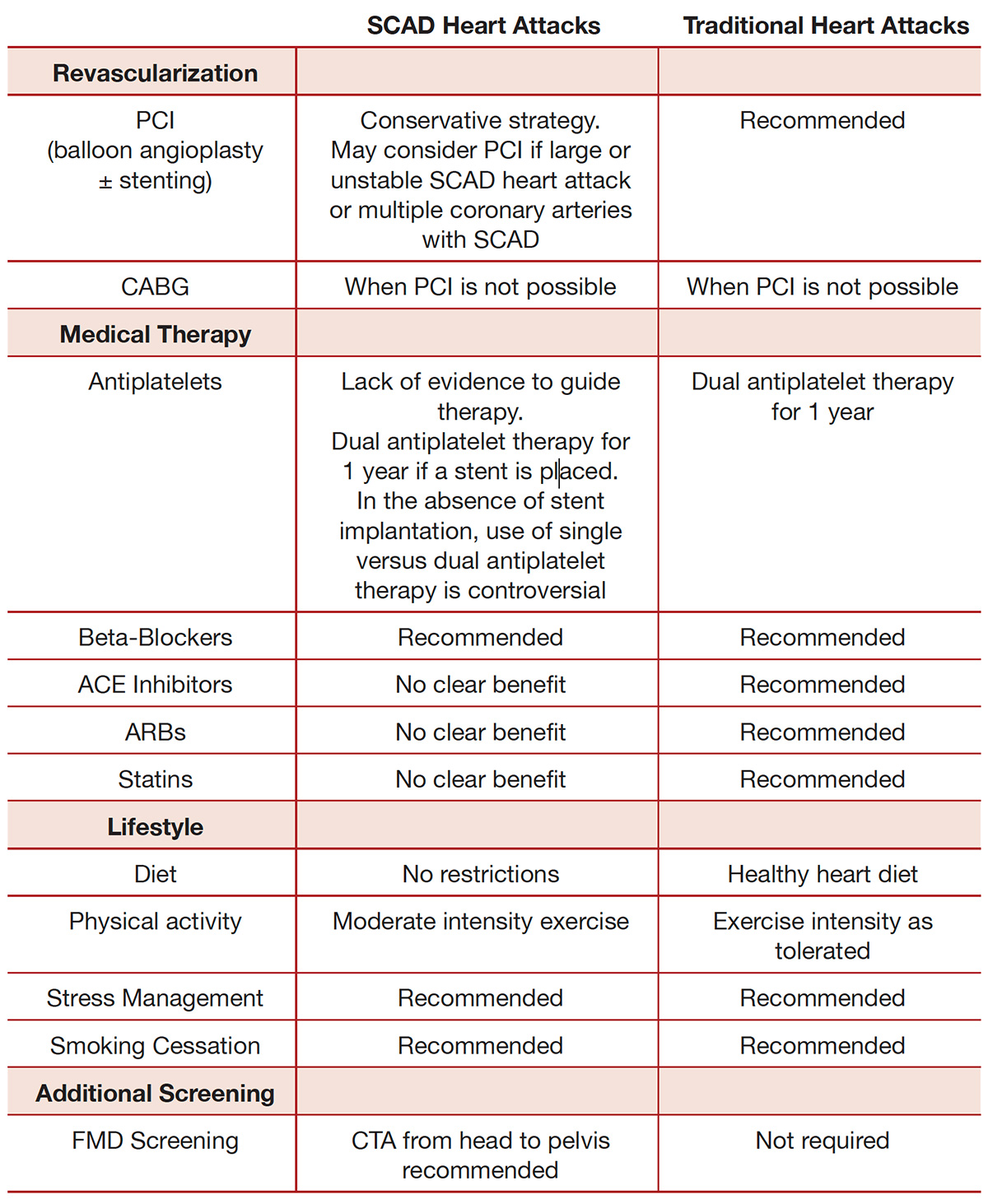What medications should I be on?
There are no randomized controlled trials to guide medical therapy in SCAD. A randomized controlled trial involves researchers deciding randomly as to which participants in the trial receive a new treatment and which receive a placebo, or ‘fake’ treatment. This is how we study the benefits and side effects of medications to provide evidence for their use.
Some commonly prescribed medications include the following:
- Antiplatelet agents: These are mild blood thinners that stop cells in the blood (platelets) from sticking together and forming a clot. There is a lack of evidence to guide the duration of antiplatelet therapy and the number of antiplatelet medications to be used.
- Single antiplatelet therapy refers to treatment with one antiplatelet medication, usually low dose aspirin.
- Dual antiplatelet therapy refers to low dose aspirin plus a second antiplatelet agent which may be clopidogrel (Plavix), ticagrelor (Brilinta) or prasugrel (Effient).
- If a stent was placed, dual antiplatelet therapy is generally recommended for1 year.
- If there is no stent used the use of single versus dual antiplatelet therapy is controversial. Currently, many centers prefer the use of a single antiplatelet medication (aspirin) while some recommend that patients are treated with dual antiplatelet therapy
- Beta-blockers: These are medications that slow your heart rate and may reduced the force that the blood vessels experience by the blood being pumped through. Only one study has shown benefit with beta-blocker use in SCAD patients. This study showed a lower rate of recurrent SCAD heart attacks in patients who took beta-blockers
- Anti-hypertensives: These are medications that aim to lower your blood pressure. It includes a wide variety of medications such as angiotensin-converting enzyme inhibitors (ACE inhibitors), angiotensin II receptor blockers (ARBs), calcium channel blockers (CCBs) and nitroglycerin among other classes. One study showed that high blood pressure was associated with a higher risk of recurrent SCAD heart attacks and therefore recommended the use of anti-hypertensive medications to treat high blood pressure. There is no evidence that these medications have direct benefit in SCAD, however they may be used as an antihypertensive to lower blood pressure.
- Angiotensin-Converting Enzyme (ACE) Inhibitors: These medications relax (dilate) the blood vessels and decrease the blood volume to lower blood pressure.
- Angiotensin II Receptor Blockers (ARBs): These medications are similar to ACE inhibitors. They relax (dilate) the blood vessels and lower blood pressure.
- Calcium-channel blockers (CCBs): These medications lower blood pressure by preventing calcium from entering the cells of your heart and arteries.
- Nitroglycerin: This medication lowers blood pressure by relaxing (dilating) blood vessels, and may also help with symptoms of chest pain after SCAD, which is not so uncommon.
There are some situations where medications should be used. These include if the patient underwent PCI or if the patient has a weak heart, also known as left ventricular dysfunction or heart failure. In these situations, medical therapy would often include the following:
- Percutaneous coronary intervention (PCI): Dual antiplatelet therapy for at least one year. This includes aspirin plus a second antiplatelet either clopidogrel (Plavix),ticagrelor (Brilinta) or prasugrel (Effient).
- Left ventricular dysfunction: Medical therapy is based on the heart failure guidelines. It often includes sacubitril/valsartan (Entresto), an ACE inhibitor or ARB as well as a beta-blocker, a mineralocorticoid receptor antagonist and an SGLT-2 inhibitor.
Medications that should be avoided in SCAD, if possible, include triptans such as sumatriptan used for migraines, stimulants such as ADHD medications or cocaine, and hormonal therapy. The use of these medications after SCAD should be discussed with your doctors.
Table 3: Key differences in the treatment of SCAD heart attacks compared with traditional heart attacks.







